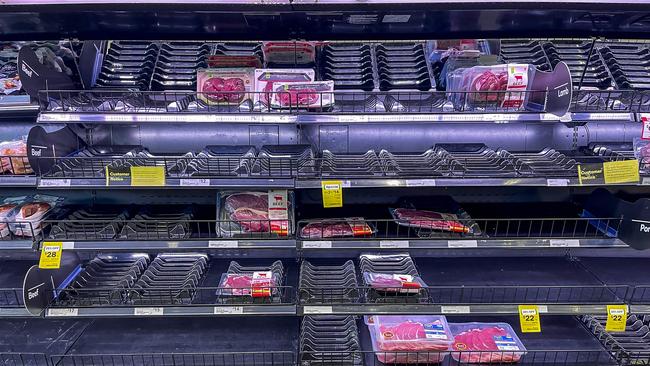Food plan call to limit supply shocks
Bare shelves and wildly fluctuating prices could be a thing of the past under a national food plan that considers supply from a national security perspective.

Food and agriculture organisations have called on the Albanese government to establish a national food plan to cast the industry in terms of national security and permanently address supply chain issues, prevent shortages and ensure Australians have access to affordable, quality produce.
A national food plan was a key recommendation of a federal inquiry in December, which found it could help to stabilise food price fluctuations during supply chain disruptions.
It would tackle the national security implications of food and deal with the production and distribution of food in Australia, focusing on supply chain resilience, access to food, nutrition and food waste management.
Among the 14 organisations calling for the plan are the National Farmers Federation, Foodbank, AUSVEG and Independent Food Distributors Australia.
“It is critical that all areas of the food sector are brought together to prioritise issues of national importance now and into the future and that there be closer collaboration within government portfolios with a direct or indirect relationship with the food sector,” IFDA chief executive Richard Forbes said.
The inquiry by the parliamentary agriculture committee was ordered after the Covid pandemic, war in Ukraine and natural disasters led to food shortages on supermarket shelves and put strain on the ability of farmers to get their produce to consumers.
The committee recommended appointment of a federal minister for food and for the plan to be created by a new national food council, which would provide input from defence, education and environment stakeholders.
NFF president David Jochinke said a national food plan should be a priority for the government but not at the expense of dealing with other immediate problems facing consumers and farmers.
“The challenges facing the food supply chain have become more complex,” Mr Jochinke said. “It makes sense to have a clear plan for the future to ensure we keep farmers farming and keep food on the shelves for Australians in the face of disruptions.

“A clear plan shared by industry and government that sets out our vision to grow the sector and keep it resilient makes sense. We’d love to see the government make this a priority.
“We’d caution however, that this can’t become an excuse to kick pressing issues down the road.
“The plan is about our future resilience, but there are issues crippling industry in the present – from labour shortages to competition issues – that need immediate attention.”
Foodbank chief executive Brianna Casey, whose organisation co-ordinates provision of food to almost 3000 charities, said despite Australia producing enough food to feed the nation three times over, 3.7 million households had experienced a food insecurity problem in the past year and shortages were exacerbated by supply chain disruptions.
“This national food plan is going to be crucial to us reducing the number of households who are struggling with hunger,” Ms Casey said.
“It’s also going to be pivotal if we are to genuinely deliver an objective that the Australian government has agreed to and that is around halving per capita food loss and waste by 2030.”







To join the conversation, please log in. Don't have an account? Register
Join the conversation, you are commenting as Logout